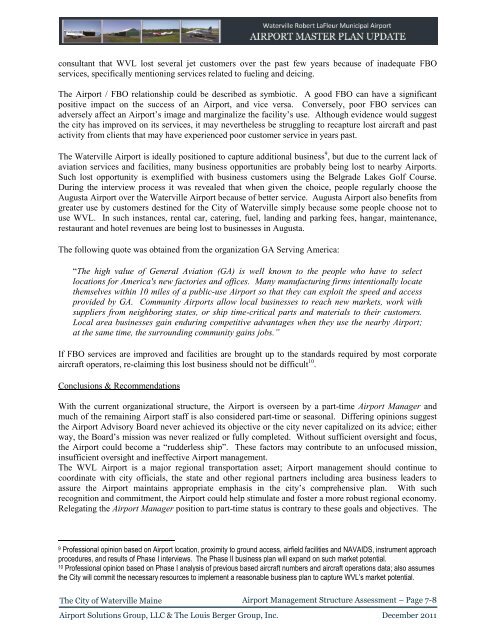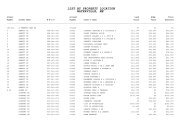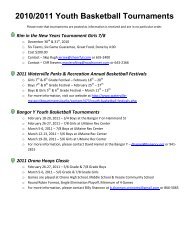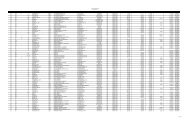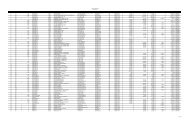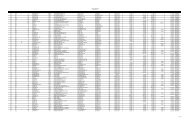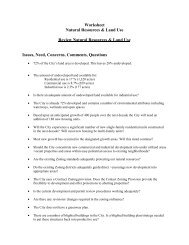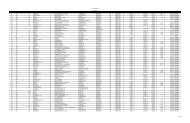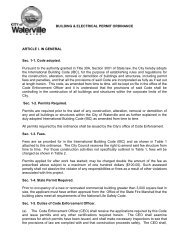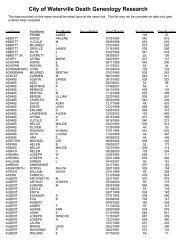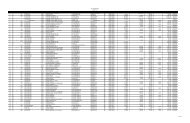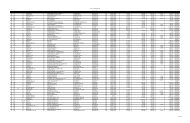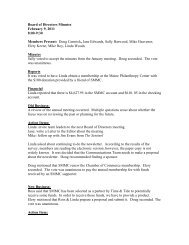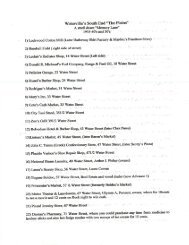Airport Master Plan 2012 - City of Waterville
Airport Master Plan 2012 - City of Waterville
Airport Master Plan 2012 - City of Waterville
Create successful ePaper yourself
Turn your PDF publications into a flip-book with our unique Google optimized e-Paper software.
consultant that WVL lost several jet customers over the past few years because <strong>of</strong> inadequate FBO<br />
services, specifically mentioning services related to fueling and deicing.<br />
The <strong>Airport</strong> / FBO relationship could be described as symbiotic. A good FBO can have a significant<br />
positive impact on the success <strong>of</strong> an <strong>Airport</strong>, and vice versa. Conversely, poor FBO services can<br />
adversely affect an <strong>Airport</strong>’s image and marginalize the facility’s use. Although evidence would suggest<br />
the city has improved on its services, it may nevertheless be struggling to recapture lost aircraft and past<br />
activity from clients that may have experienced poor customer service in years past.<br />
The <strong>Waterville</strong> <strong>Airport</strong> is ideally positioned to capture additional business 9 , but due to the current lack <strong>of</strong><br />
aviation services and facilities, many business opportunities are probably being lost to nearby <strong>Airport</strong>s.<br />
Such lost opportunity is exemplified with business customers using the Belgrade Lakes Golf Course.<br />
During the interview process it was revealed that when given the choice, people regularly choose the<br />
Augusta <strong>Airport</strong> over the <strong>Waterville</strong> <strong>Airport</strong> because <strong>of</strong> better service. Augusta <strong>Airport</strong> also benefits from<br />
greater use by customers destined for the <strong>City</strong> <strong>of</strong> <strong>Waterville</strong> simply because some people choose not to<br />
use WVL. In such instances, rental car, catering, fuel, landing and parking fees, hangar, maintenance,<br />
restaurant and hotel revenues are being lost to businesses in Augusta.<br />
The following quote was obtained from the organization GA Serving America:<br />
“The high value <strong>of</strong> General Aviation (GA) is well known to the people who have to select<br />
locations for America's new factories and <strong>of</strong>fices. Many manufacturing firms intentionally locate<br />
themselves within 10 miles <strong>of</strong> a public-use <strong>Airport</strong> so that they can exploit the speed and access<br />
provided by GA. Community <strong>Airport</strong>s allow local businesses to reach new markets, work with<br />
suppliers from neighboring states, or ship time-critical parts and materials to their customers.<br />
Local area businesses gain enduring competitive advantages when they use the nearby <strong>Airport</strong>;<br />
at the same time, the surrounding community gains jobs.”<br />
If FBO services are improved and facilities are brought up to the standards required by most corporate<br />
aircraft operators, re-claiming this lost business should not be difficult 10 .<br />
Conclusions & Recommendations<br />
With the current organizational structure, the <strong>Airport</strong> is overseen by a part-time <strong>Airport</strong> Manager and<br />
much <strong>of</strong> the remaining <strong>Airport</strong> staff is also considered part-time or seasonal. Differing opinions suggest<br />
the <strong>Airport</strong> Advisory Board never achieved its objective or the city never capitalized on its advice; either<br />
way, the Board’s mission was never realized or fully completed. Without sufficient oversight and focus,<br />
the <strong>Airport</strong> could become a “rudderless ship”. These factors may contribute to an unfocused mission,<br />
insufficient oversight and ineffective <strong>Airport</strong> management.<br />
The WVL <strong>Airport</strong> is a major regional transportation asset; <strong>Airport</strong> management should continue to<br />
coordinate with city <strong>of</strong>ficials, the state and other regional partners including area business leaders to<br />
assure the <strong>Airport</strong> maintains appropriate emphasis in the city’s comprehensive plan. With such<br />
recognition and commitment, the <strong>Airport</strong> could help stimulate and foster a more robust regional economy.<br />
Relegating the <strong>Airport</strong> Manager position to part-time status is contrary to these goals and objectives. The<br />
9 Pr<strong>of</strong>essional opinion based on <strong>Airport</strong> location, proximity to ground access, airfield facilities and NAVAIDS, instrument approach<br />
procedures, and results <strong>of</strong> Phase I interviews. The Phase II business plan will expand on such market potential.<br />
10 Pr<strong>of</strong>essional opinion based on Phase I analysis <strong>of</strong> previous based aircraft numbers and aircraft operations data; also assumes<br />
the <strong>City</strong> will commit the necessary resources to implement a reasonable business plan to capture WVL’s market potential.<br />
The <strong>City</strong> <strong>of</strong> <strong>Waterville</strong> Maine<br />
<strong>Airport</strong> Management Structure Assessment – Page 7-8<br />
<strong>Airport</strong> Solutions Group, LLC & The Louis Berger Group, Inc. December 2011


